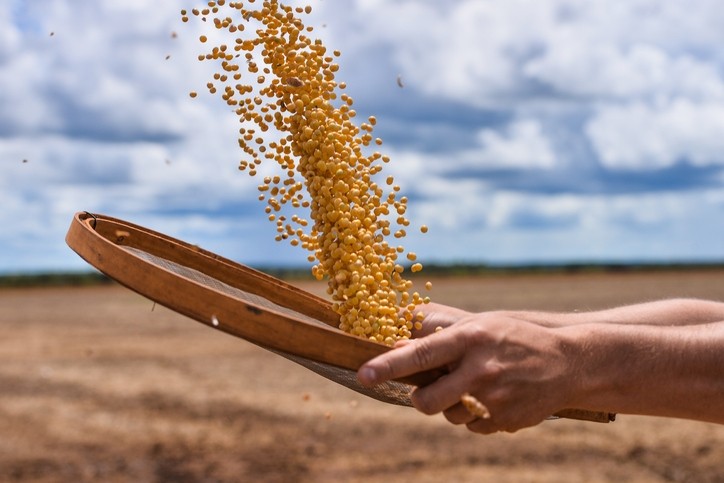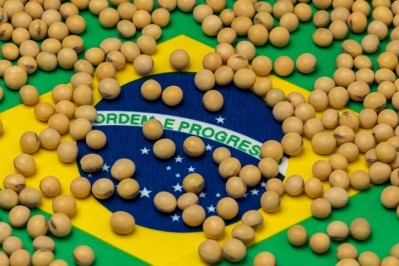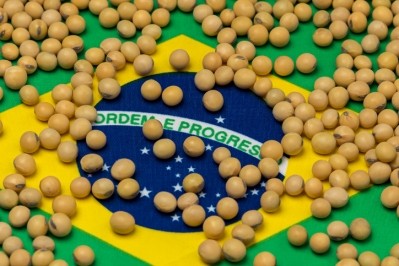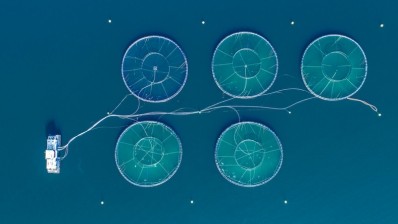BioMar probe shows its soy suppliers are legally compliant

The fish feed manufacturer’s audit team and a sustainability lead recently returned from a fact-finding mission to Sorriso, Mato Grosso, the capital of Brazil’s soybean industry, to examine conditions pertaining to the report from NGOs, Future in our Hands, and Rainforest Foundation Norway, Salmon on soy beans - Deforestation and land conflict in Brazil.
The findings of that NGO report, first revealed by Norwegian newspaper, Dagbladet, last October, alleged those three Brazilian soy suppliers, Caramuru, Selecta and Imcopa, which supply some of Norway’s leading salmon feed firms, were associated with violence, land grabbing, deforestation, illegal pesticide use and slave labor through the farms they buy from.
Selecta, in comments to Dagbladet last October, strongly disputed the claims in that report, while Caramuru also questioned some of the findings. Imcopa told the Norwegian newspaper, at the time, one discredited farm was a key supplier to it in previous years, but that now it only delivers less than 3% of the total amount of soy in Imcopa’s inventory.
BioMar group sustainability specialist, Erik Olav Gracey, who participated in the company’s mission in Brazil, told us why the company saw fit to get a first-hand account of the situation: “BioMar undertakes regular audits to many of our suppliers. We were very surprised by the findings of the report so we needed to form a taskforce with auditing and sustainability skill to investigate the allegations."
The BioMar delegation did a lot of background, due diligence work, then spent three days in Sorriso, where they met up with Caramuru. “We had preparatory meetings with all of our Brazilian suppliers prior to our visit to Brazil, between those and our onsite visits we were able to investigate all of our suppliers. In Sorriso, we had two and half days of intense auditing and Q&A at Caramuru’s offices. They opened up all of their purchasing policies, and showed us the way they check their suppliers for legal compliance with the Forest Code and labor laws.”
Caramuru, he continued, showed the BioMar team some of the tools it is using to improve legal compliance in its supply chains, such as high definition satellite-based software that allows for clear delineation between conservation land and productive areas, and third-party certification schemes with independent yearly audits.
Soy, in the form of soy protein concentrate (SPC) from Brazil, is an important source of protein and a key ingredient in the feed consumed by Norwegian farmed salmon. In Norway, food and feed manufacturers are required to use soy that has not been genetically modified (non-GMO), so they are highly dependent on soy cultivation in Brazil, that country being the biggest supplier of non-GMO soy globally.
BioMar buys between 20,000 and 60,000 metric tons combined of non-GMO soy annually from Caramuru, Selecta and Imcopa.
“However, our mission was not only focused on the suppliers, we also wanted to find out what the climate was surrounding these allegations, and that included going over the legal framework for what is considered deforestation, legal and illegal, determining what the definition of slave labor is, what the conditions are in relation to human rights, what the audit processes are, and who is performing those audits,” explained Gracey.
The non-GM soy supply from Caramuru, Imcopa and Selecta is ProTerra-certified, a standard BioMar still has confidence in as “another layer of governance” in a complicated system in terms of monitoring and enforcement, despite the Rainforest Foundation’s report identifying what it saw as weak points in that standard’s approach.
The Brazilian agricultural sector, said Gracey, is regulated by some of the most complex and robust legislation in the world. However, despite an impressive legal framework for forest conservation and human rights, BioMar found that effective enforcement and implementation of key legislation by government agencies is hampered by the sheer size of the country, unstable political climate, and the lack of resources in key areas.
“The International Labor Organization (ILO) has recognized Brazil’s audit program for inspecting work conditions and the framework around work conditions to be a benchmark for best practice. So it is not just the environmental part, Brazil has very strong labor laws as well. But Brazil is such a huge country, and the agricultural regions are often far removed from the governmental centers; this remoteness results in agency enforcement challenges there and puts a strain on those programs.”
Skretting inquiry found ‘no evidence of any illegality’
Skretting, another major salmon feed manufacturing targeting the Norwegian market, also ran an inquiry subsequent to the publication of the Rainforest Foundation report; it collaborated with the internationally accredited audit company, DNVGL, to review the allegations related to those three suppliers. DNVGL investigated the claims and carried out a sustainability audit of those Brazilian firms; the report was delivered to Skretting in November 2018. No evidence of any illegality was found.
The DNVGL team said it is difficult to check allegations of criminal activity when there are no judicial decisions, in particular in relation to claims over the use of illegal pesticides. Similarly, they said it is difficult to check claims of land conflicts as there is no public register of such conflicts.
Skretting said the audit showed no soy bought by its suppliers came from farms that ran illegal deforestation, and this finding was verified by comparing farm data to publicly available data from the Brazilian Institute of Environment and Renewable Natural Resources (IBAMA).
Similarly, it confirmed that no soy bought by its suppliers came from farms that were blacklisted by the authorities over slave-like working conditions. Working conditions were checked against the slave labor lists published by the Brazilian Ministry of Labor (MTE).
Brazil has five million farms, and both authorities and companies are working to get a better overview and to use systems that will make it easier to register and check illegality, said Skretting.
Danish project
BioMar has been actively engaged in capacity building on South American soy supply chains for several years, lately as part of the project, Responsible Sourcing of Soy, Cattle and Palm Oil, run by NEPCon and SEGES and funded by the Ministry of Foreign Affairs of Denmark.
The project’s aim was to help Danish industry conduct risk assessments and mitigation actions to minimize social and environmental risks when sourcing forest impact commodities.
Gracey said participation in that NEPCon project also improved BioMar’s ability to understand the complexities of legal compliance with environmental and human rights law in South America, including Brazilian laws pertaining to deforestation and human rights.
“While we specifically focused on Brazil, we had risk assessments done for Paraguay, Argentina and Bolivia. Anything grown in a region with that level of globally important biodiversity and intact forest has to have better oversight that other areas.
“NEPCon helped clarify different frameworks for legal compliance, helped us to create really specific and comprehensive supplier checklists, and indicated the kind documentation we should look for to prove that a farm is operating in legal compliance. It also gave us additional suggestions for improving our existing audit program, which will allow us to broaden our scope when we are looking at more high risk commodities.”
Collaboration
This level of oversight is absolutely necessary, given the world we live in today, said Gracey.
“When you look at any study of biodiversity coming out recently, particularly the FAO’s review, The State of the World’s Biodiversity for Food and Agriculture, you can see there is ample room for improvement. The aquaculture industry accounts for a very small fraction of global feed production, but, even so, we are sourcing agricultural commodities that may be in conflict with natural vegetation and forest. At BioMar we believe it is our responsibility to fully understand those impacts, so we can make better, more informed decisions.”
The aquaculture industry has to make a clear market signal, has to get across to soy producers that it wants “responsibly produced” soy and it must really define what it means by “responsibly produced” soy, stressed Gracey. There is no shortage of companies lining up to buy soy from farmers in Brazil and elsewhere, and they may not have the same environmental or social requirements, he warned.
“One thing that can be said is that the report from the Rainforest Foundation and Future in our Hands has shown there is huge interest internationally in more responsible production, the issue of deforestation, and in indigenous rights, that a lot of stakeholders care about that.”
But the narrative over Brazilian soy has been overwhelmingly negative in most media channels, he said
“I think the biggest takeaway, for me, from our fact-finding mission to Brazil and also from the due diligence we did before and after that visit, is that Brazil is really trying to produce responsibly. It has a good legal framework in place, it is huge but it wants to grow sustainability. I believe the best move forward is a collaborative approach between NGOs, feed producers, soy suppliers and farmers to help create a solid structure for implementation and continued governance.”














